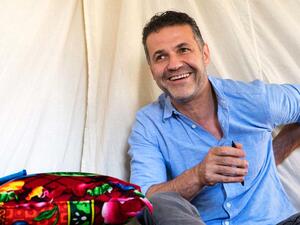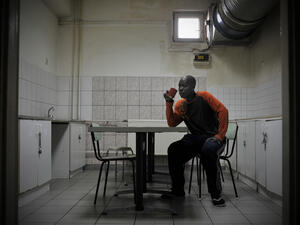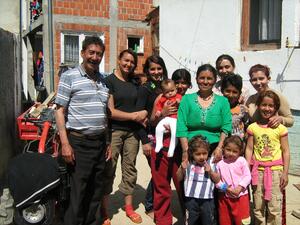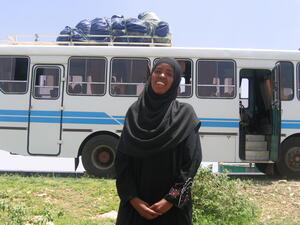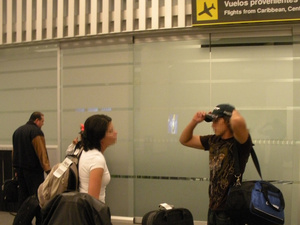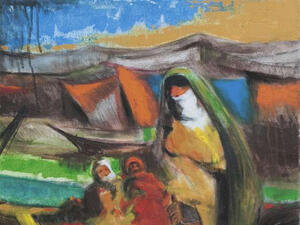Feature: Congolese refugee in Monrovia turns drawback into an asset
Feature: Congolese refugee in Monrovia turns drawback into an asset
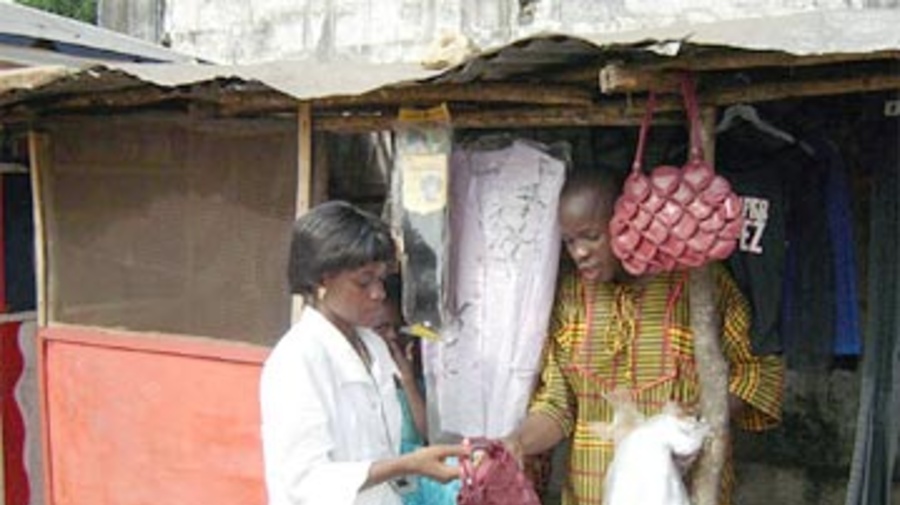
After years of barely surviving on a UNHCR monthly subsistence allowance, Charlotte Ngunu (left) is now able to take care of herself – thanks to a self-sufficiency project of the UN refugee agency.
MONROVIA, Liberia, Feb. 18 (UNHCR) - Congolese refugee Charlotte Ngunu has become more optimistic about life since she began running her own business.
When she arrived in Liberia six years ago after fleeing civil war in the Democratic Republic of the Congo (DRC), life seemed to be a constant struggle: first with the language barrier as she is a native French speaker in an English-speaking environment; then, as an illegal asylum seeker with no identity documents. Desperate after one year of grappling with such difficulties, Charlotte called on the UNHCR office in Monrovia.
"I was given an attestation and my medical bill was covered by UNHCR," she remembers. The attestation, a document delivered by the refugee agency, certifies that a person is an asylum seeker which automatically grants its holder the status of being of concern to UNHCR and therefore under international protection. And that eased Charlotte's fear of freely moving about in the city, particularly as then in the year 2000 Liberia was still grappling with war and the identity checks were many.
Next, Charlotte also began to receive a monthly subsistence allowance from UNHCR. "The allowance was helpful but insufficient to carry me through the next disbursement," Charlotte reflected while retelling how she started.
Charlotte fled to Monrovia in 1998 after her father, a soldier, was killed in a rebel insurrection in eastern DRC that would send hundreds of thousands of Congolese fleeing across its borders. Charlotte went to Côte d'Ivoire in West Africa. After a year of hardship there, she decided to take the chance to move to Liberia with a few Liberian refugee families who returned home in one bright spell in the on-again-off-again civil conflict in their country.
She is one of the 98 registered urban refugees of different nationalities currently seeking asylum in Liberia. Urban refugees are those who elected to live in the capital city instead of joining refugee settlements in the countryside. They include Sudanese, Ivorians, Algerians, Congolese from Congo Brazzaville and the DRC, Nigerians, Rwandans, Somalis and Togolese.
In 2004 UNHCR developed a project aimed at weaning urban refugees from dependency to a sustainable way of life in an urban setting. Charlotte was among 16 refugees who fulfilled the requirement to qualify for a grant. The criteria for acceptance included willingness to become independent of UNHCR stipends and to be a bona fide registered refugee.
She then received US$1,400 in two instalments, a hefty amount by the living standards of a failed state attempting to recover from 14 years of civil war.
"When I received the first instalment I realized that the amount could not open a shop but I had to do something," she recalled. After careful thought, Charlotte decided to follow a group of Liberian women traders to Guinea where they purchased goods that they sold in Monrovia. "Surprisingly," she recounts with a bright smile, "I became an asset as I could speak French."
Charlotte has since been travelling to Guinea by road to buy such goods as the colourful wax print clothes traditionally worn by West African women, shoes and bags that she later sold to shop owners and individuals.
As part of its self-sufficiency project, the refugee agency offers small business training to avoid failures. Charlotte is grateful to UNHCR for the grant and knowledge gained from a management workshop she attended before going into business. "From what I was taught at the workshop, I opened a savings account with a local bank and at least can access money whenever I need it."
Every morning, she visits her customers, either to collect debts or to entice them to buy new items.
Daily life has also improved for Charlotte, who used to live with friends. Now, she rents a place of her own and is able to send her child to school, two competing priorities in the past. She is also enrolled in a computer course that she is about to complete, with the hope that her new skills will help her better manage her business.
At 37 years of age, Charlotte considers the changes in her life as a miracle and says she feels a much better person earning her own income. She is also confident about the future, as she contemplates returning to her homeland as a successful businesswoman and believes it is possible. "The secret is you have to like what you do, treat your customers well and learn how to save your profit," she said.
By Sarah Brownell in Monrovia, Liberia


